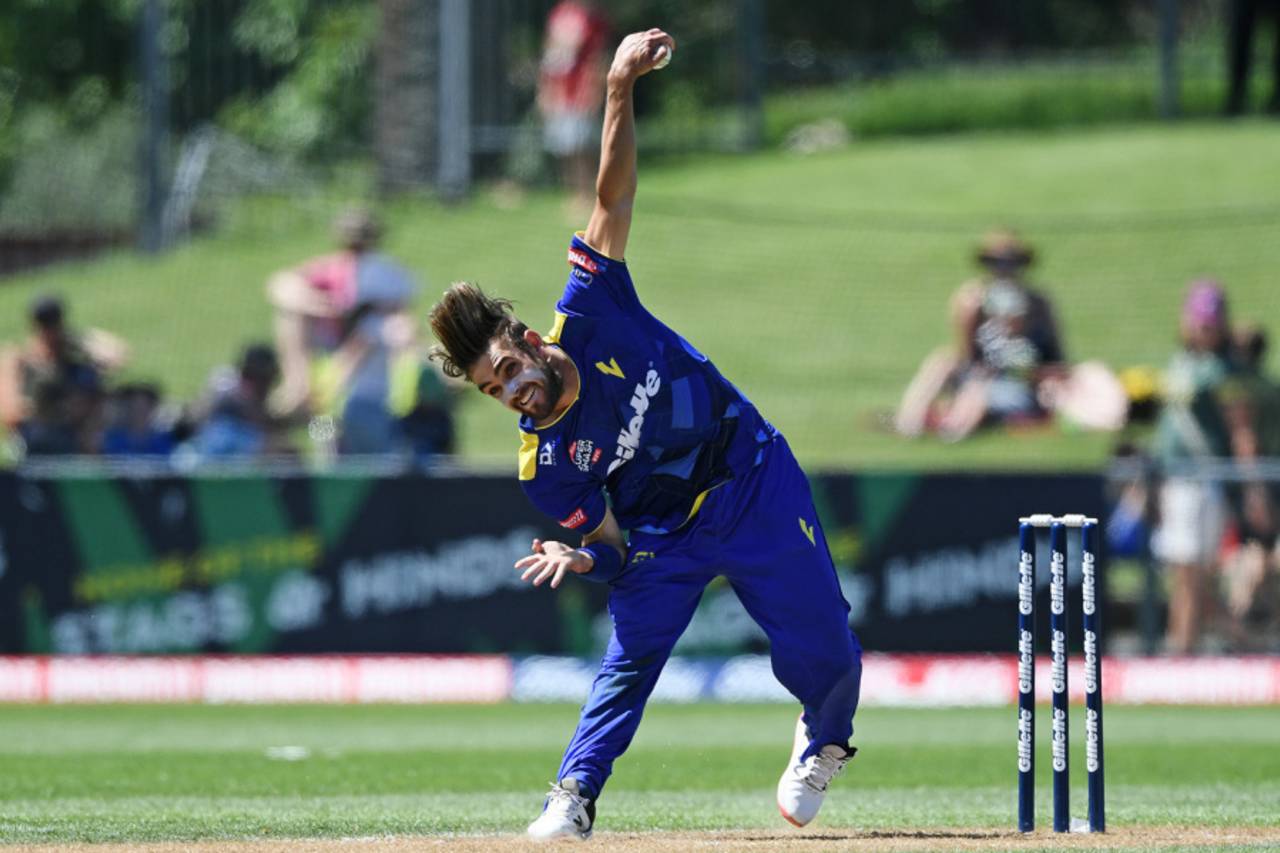Michael Rippon: 'As a spinner in New Zealand, you must learn to play a holding role'
The left-arm wristspinner talks about his move from Netherlands to New Zealand

Michael Rippon: "Jonathan Trott's dad first told me I could try my hand at left-arm spin" • Kerry Marshall/Getty Images
It's quite cool, isn't it? I was born and raised in Cape Town but qualified to play for Netherlands thanks to my maternal grandfather, who moved there in the late 1970s. And then in 2017 I left South Africa to move to New Zealand on a short-term contract as a substitute player. I seriously didn't know then this is where I'd make a life and one day, maybe, play for the Black Caps.
I started off as a left-arm fast bowler, but I watched Shane Warne and Brad Hogg a lot growing up. It was Jonathan Trott's dad, Ian, who first told me I could try my hand at left-arm spin. I began with left-arm orthodox, but I felt like bowling left-arm wristspin, and the variations came naturally to me, so at representative cricket at the Under-15s, I made the switch.
You must make peace with the fact that you won't always take bucketloads of wickets. You must learn to play a holding role, build pressure on batters. That is where I suppose my variations and left-arm wristspin come into the picture. There's a novelty factor initially, and just the art is such that there's always a bit of intrigue to it. If you can get it right, you can do a job across different types of conditions.
Because I had a European passport, I was able to move to the United Kingdom for a county stint with Sussex. That is when word spread that I could qualify to play for Holland too. They asked me if I'd like to play for them, and I thought it was a great opportunity. From 2013 to 2016, I was part of the team's journey through the World Cricket League Division Two. Since we'd been relegated there, we were trying to qualify for WCL Division One.
Since Covid hit and I hadn't got my New Zealand residency, I couldn't leave the country [New Zealand], so that thwarted my ambition of playing for Netherlands at the T20 World Cup last year. Also, it clashed with our domestic schedule here. When Netherlands announced a historic tour to New Zealand, it all worked out wonderfully. I was in a lucky position. I had it clear to Netherlands of my ambition to play for New Zealand. They were understanding of it. Playing for them was a great chance to play at the international level.

(Laughs). Yeah, it was around then I got a call from Devon, who asked me how life was in the country. I spoke glowingly about it, and that is when he too decided to come over. I thought he'd come to Otago, but he went over to Wellington.
Associate cricket is cut-throat. In 2014 we finished outside the top six, so we lost ODI status and funding. I remember sitting in the team hotel after our loss to Kenya wondering what we'd do next. We had to find jobs. Some of the guys were contemplating studies. We didn't know where our future was. But then, we set ourselves a goal to be the best Associate and we went through a three-year cycle trying to achieve that. Of course, after the 2019 World Cup, the Super League came into being, which allowed us to play the top sides to have a shot at qualifying for the 2023 World Cup. But that's not going to go forward after the 2023 World Cup, so once again a lot of the players will be left wondering what next.
I was too small to play rugby, so cricket and tennis were my summer sports and hockey my winter sport. When I was 15, Trott's dad saw the potential in me and got me playing cricket. I left hockey then and played cricket through the year. When I was 19, I got picked by the Cape Cobras for my first full year of professional cricket.
The visa I was on initially only allowed me to work in New Zealand. It was only in 2019 that I was able to switch to a talent visa, which, if you're on for three years, you're eligible to apply for residency. This March, my residency was approved, so New Zealand is my home now. I bought a house earlier this year. I've seen my career develop by leaps and bounds. The system is great, the people are wonderful, there's great culture. In terms of my career and my future, it's firmly planted here.
Shashank Kishore is a senior sub-editor at ESPNcricinfo